
Nov 26, 2019 | News
Three exceptional women – Huda Al-Sarari, Norma Ledezma and Sizani Ngubane – are the finalists for the 2020 Martin Ennals Award, a demonstration of the leading position now occupied by women in the defence of human rights. The ICJ is member of the MEA Jury.
In Yemen, Huda Al-Sarari has exposed and challenged the existence of secret prisons and many cases of torture.
In Mexico, Norma Ledezma is fighting against femicides and disappearances.
In South Africa, Sizani Ngubane is fighting for access for women to education and to land.
Three women nominated: a first
Each year, the Martin Ennals Award rewards human rights defenders from around the world who distinguish themselves by their strong commitment to promoting human rights – often at the risk of their own lives.
In 2020, for the first time the Jury nominated three women who defend the fundamental rights of their communities in sensitive contexts.
“The Martin Ennals Foundation is proud to recognize the courageous work of three women. For the 2020 edition, our Jury’s choice reflects the ever-greater global impetus of individuals – whatever their gender – who are committed to respect for human rights and women’s rights in particular,” said Isabel de Sola, Director of the Martin Ennals Foundation.
“The finalists for the 2020 Martin Ennals Award work on different continents, but all three have in common their resilience, determination, a tremendous rigour and, finally, the positive and concrete impact of their work,” added Hans Thoolen, Chairman of the Jury.
In Yemen, where the conflict has been ongoing since 2005, Huda Al-Sarari, a Yemeni lawyer, unveiled the existence of several secret detention centres where the worst violations of human rights were committed: torture, disappearances or even extrajudicial executions.
In South Africa, women face discrimination, the worst expression of which is widespread gender violence. In rural communities, they frequently have their land expropriated and are deprived of access to education and justice. Sizani Ngubane founded an organization of more than 50,000 women from rural areas in her country and has fought successfully for over 40 years for the recognition of their rights.
In Mexico, the civil population is paying a high price for the weakness of the rule of law which is underpins widespread violence and impunity. Women are the primary victims, with more than 3,500 femicides committed each year. Norma Ledezma, who is the mother of one of the victims, puts all her energy into supporting families seeking access to justice in the state of Chihuahua.
The finalists were selected by a jury made up of representatives of ten of the world’s leading human rights organizations: the ICJ, Amnesty International, Human Rights Watch, Human Rights First, International Federation for Human Rights, World Organisation Against Torture, Front Line Defenders, EWDE Germany, International Service for Human Rights and HURIDOCS.
The 2020 Martin Ennals Award will be given to one of the three finalists on 19 February 2020 at a livestreamed public ceremony. The event is hosted by the City of Geneva which, as part of its commitment to human rights, is a longstanding supporter of the Award.
Contact
Olivier van Bogaert, Director Media & Communications, ICJ representative in the MEA Jury, t: +41 22 979 38 08 ; e: olivier.vanbogaert(a)icj.org
Chloé Bitton, Communications Manager, Martin Ennals Foundation, t +41 22 809 49 25 e: cbitton(a)martinennalsaward.org
Universal-MEA2020bios-News-2019-ENG (full bios of finalists, in PDF)
Universal-MEA2020bios-News-2019-ARA (full story and bios of finalists in Arabic, PDF)
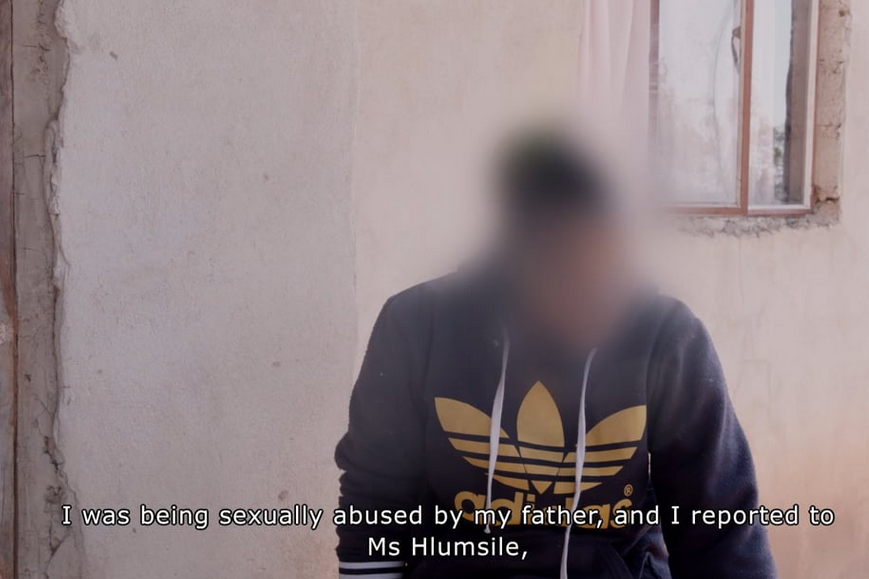
Nov 25, 2019 | Multimedia items, News, Video clips
The ICJ just launched a 15 minute documentary showing contributions by the ICJ and local human rights defenders in bringing the Sexual Offences and Domestic Violence (SODV) Act to pass in Mbabane, Eswatini.
The documentary was launched at an SODV Act media training held with the Cooperation for the Development of Emerging Countries (Cospe) and the Editor’s Forum. The training was aimed at taking a human rights-based approach to understanding the Act, following pushback from those who have expressed the view that parts of the Act are an as an affront to Swazi tradition and culture.
In an effort to combat the various challenges presented by SGBV, the Kingdom of Eswatini introduced the Sexual Offences and Domestic Violence (SODV) Act in 2018. The Act complies with its commitments under international and regional human rights law to fight the scourge of SGBV in the country.
The documentary highlights the way in which the Act is expected to be instrumental in combatting the scourge of sexual and gender-based violence, as well as areas in which it has been contested. The documentary was well-received by participants of the training and opened up an engaging dialogue about its usefulness.
The media is at the forefront of informing public discourse about the Act and it is hoped that this training provided some much-needed clarity around the Act.
Watch the documentary:
Contact
Khanyo Farisè (Legal Associate): e: Nokukhanya.Farise(a)icj.org
Shaazia Ebrahim (Media Officer): e: shaazia.ebrahim(a)icj.org
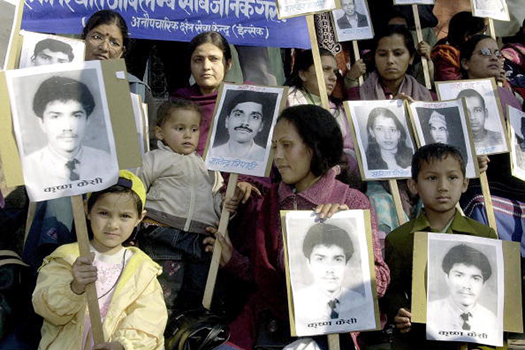
Nov 25, 2019 | News
Nepal has made no real progress on questions of justice, truth and reparations for victims of gross human rights violations and abuses during its 10-year conflict, the ICJ, Amnesty International, Human Rights Watch (HRW) and TRIAL International said today.
The Comprehensive Peace Agreement to end the war was signed on November 21, 2006.
While two commissions have been set up to address conflict-era atrocities, they have not been effective and impunity and denial of access to justice to victims remain prevalent. The four human rights organizations are particularly concerned about the recent moves that suggest that the government will go forward with the appointing of commissioners without making necessary reforms to the legal framework.
“Last week marked the 13th anniversary of the Comprehensive Peace Agreement that ended the conflict in Nepal. It is astonishing that so little progress has been made in responding to the clearly articulated concerns and demands of conflict victims,” said Frederick Rawski, ICJ’s Asia-Pacific Director. “These demands have included a transparent and consultative process for the appointment of commissioners, and a genuine good-faith effort by political leaders and lawmakers to address serious weaknesses in the existing legal framework.”
On November 18, a five-member committee formed by the government to recommend names for commissioners to be appointed to the Truth and Reconciliation Commission and the Commission on the Investigation of Enforced Disappearances published a list of candidates. Concerns have been raised by victims and civil society that the government will simply re-appoint past commissioners or make political appointments that will not be adequately impartial and independent.
“It is deeply disappointing that the government has repeatedly attempted to appoint the commissioners without adequate consultation and transparency . The commissions will not gain the trust of the victims and the international community if the political parties continue to interfere in the appointment process,” said Biraj Patnaik, South Asia Director at Amnesty International.
Importantly, the move suggests that the commissions will be re-constituted without amending the legal framework governing the transitional justice process and ensuring its compliance with Nepal’s international human rights law obligations, as directed by Nepal’s Supreme Court and demanded by civil society and victims.
Victims and civil society organizations have issued public statement making it clear that they oppose any appointments prior to the amendment of the legal framework. Notably, the National Human Rights Commission, in its statement commemorating 13th Anniversary of CPA, stated that “…the commission will not support any decision, work or activities that might hurt the sensitivity of the conflict victims…”.
“The government’s move has not only undermined victims’ role in the transitional justice process, but has also once again brought into question its commitment to uphold its international law obligations and ensuring justice for conflict-era crimes,” said Tomás Ananía, TRIAL International’s Nepal Program Manager.
The ICJ, Amnesty International, Human Rights Watch and TRIAL International have repeatedly expressed concern that effective transitional justice mechanisms require strong legal foundations consistent with international law and good practices, and the political will to address the concerns of victims of the conflict. All four organisations reiterated their calls to amend the the 2014 Transitional Justice Act to make it consistent with the Supreme Court’s rulings and international human rights standards, as well as for the initiation of a genuine consultative and transparent process for the appointment of commissioners.
Concerns raised about the existing, and proposed, legal frameworks include: disparities between the definitions of specific crimes under international law and human rights obligations and violations under national, and international law; inadequate provisions to ensure that serious crimes under international law are subject to criminal accountability (including punishment proportionate to the seriousness of the crimes); and a reliance on compensation at the expense of other forms of reparation and remedy for conflict survivors and their families.
Under the principle of universal jurisdiction states may make it possible for their domestic criminal justice system to investigate and prosecute crimes such as torture, committed by any person, anywhere in the world.
This means that a citizen of any country, including Nepal, suspected of such crimes faces the risk of arrest and prosecution for these crimes in countries that apply universal jurisdiction. This is more likely if the Nepali authorities do not appear able and willing to prosecute those responsible for such crimes, the organizations said.
“After initial pledges to ensure truth, justice, and reparations for conflict victims, it appears that the government is once again determined to protect those responsible for the crimes,” said Meenakshi Ganguly, South Asia director at Human Rights Watch. “The international community should remind Nepal that whitewashing egregious crimes will not help to dodge universal jurisdiction.”
Contact:
Download the complete press-release in English and Nepali. (PDF)
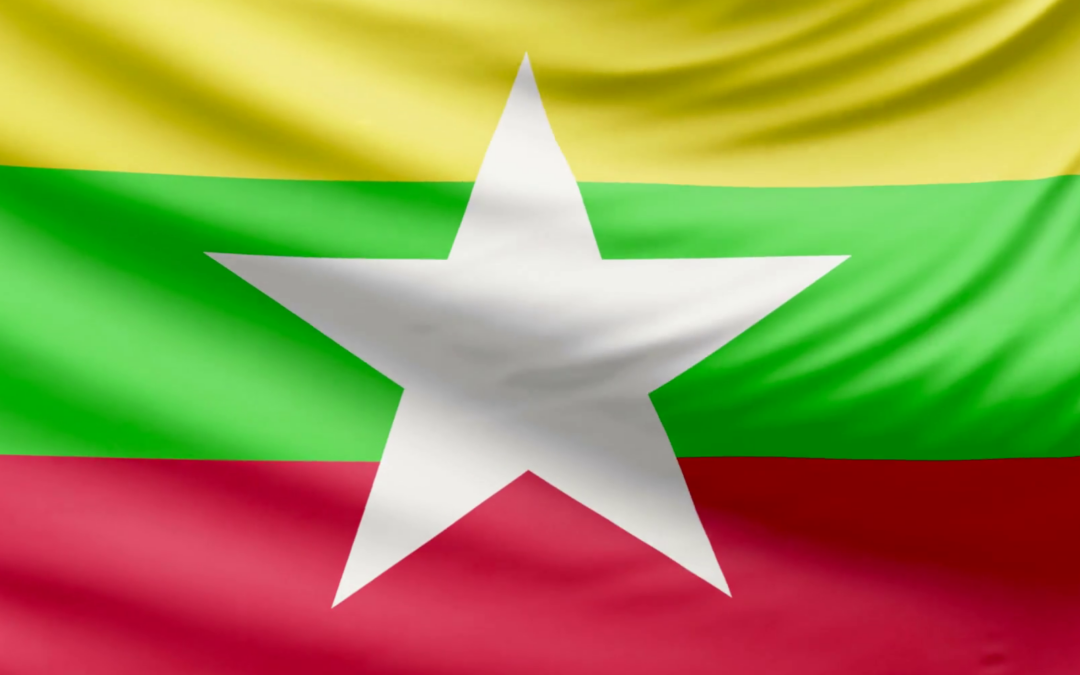
Nov 25, 2019 | Advocacy, News
The ICJ held a two-day workshop on 23-24 November 2019 in Mandalay on the application in Myanmar of international law and standards on freedom of religion and belief. Some 40 participants from across the country, including human rights defenders, religious leaders and lawyers who work on issues of freedom of religion or belief, attended the event.
The two-day workshop was conducted in order to provide a safe platform for participants to discuss pressing issues concerning the right to freedom of religion or belief (FoRB) in Myanmar, with a particular focus on protecting places of worship. It allowed participants to share challenges encountered in their spheres of activity and explore ways to address state regulations that disproportionately impact minority religions.
ICJ Associate Legal Adviser Jenny Domino introduced the international standards on FoRB applicable to Myanmar, including how FoRB affects other human rights such as the right to freedom of expression. She discussed the different constitutional approaches to protecting FoRB in Myanmar and the Philippines, and presented the applicable international standards relevant to the protection of places of worship in conflict settings. ICJ Legal Researcher Dr Ja Seng Ing shared the legal and practical challenges to protecting places of worship in Myanmar.
Based on their own independent research, the participants discussed restrictions placed on the practice of religion or belief, particularly with respect to places of worship. The participants shared challenges they encountered while working on FoRB issues, such as the shrinking civic space for inter-religious dialogue. They also discussed possible strategies to push for legislative and administrative reform to protect FoRB in Myanmar.
The workshop is part of the ICJ’s ongoing effort to convene civil society actors and lawyers in Myanmar with a view to advancing FoRB in the country, and builds on the ICJ’s regional work on this theme.
Contact
Ja Seng Ing, ICJ Legal Researcher, e: jaseng.ing(a)icj.org
Related material
Challenges to freedom of religion or belief in Myanmar, A Briefing Paper, October 2019
Primer on international human rights law and standards on the right to freedom of thought, conscience, religion or belief, January 2019
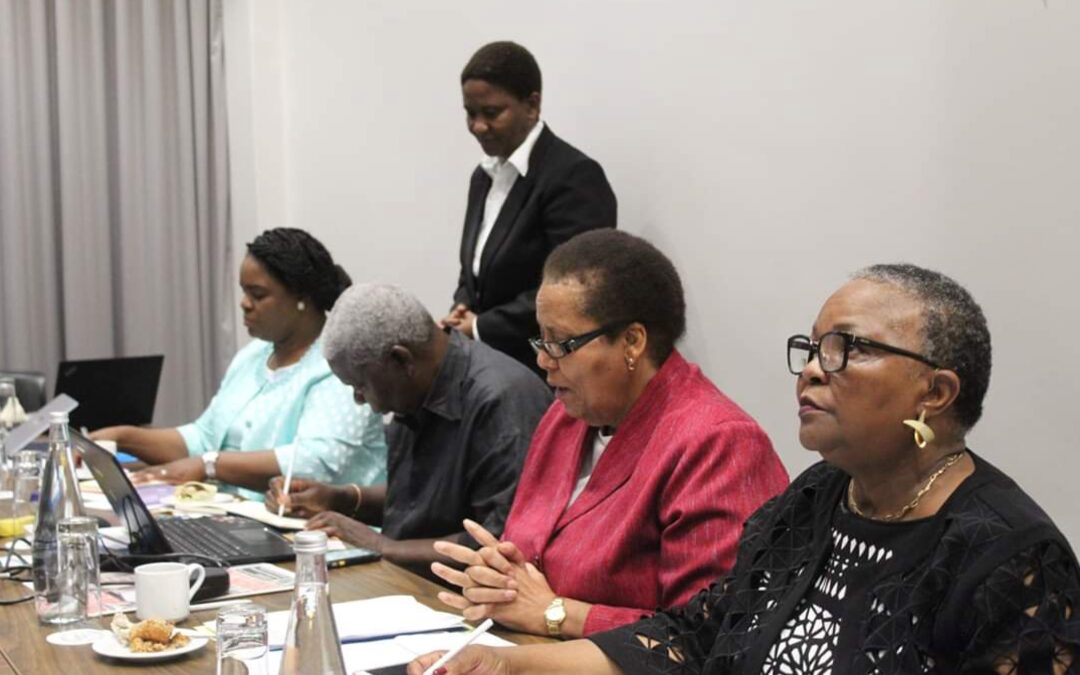
Nov 22, 2019 | News
A wide range of stakeholders in Mbabane, Eswatini came together to discuss the challenges they face in combating sexual and gender-based violence (SGBV) in the country.
On 21 November, the ICJ hosted a symposium with representatives of the Attorney General, Ministry of Justice, police, Human Rights Commission and Law Society on cases involving economic, social, and cultural rights and SGBV. The event was followed by an integrated meeting involving State officials in the justice sector to discuss the implementation of the Sexual Offences and Domestic Violence (SODV) Act was discussed.
The Kingdom of Eswatini faces widespread instances of SGBV and it is hoped that new initiatives, such the enactment of the Sexual Offences and Domestic Violence (SODV) Act in 2018, will be effective in addressing the scourge of SGBV in the country.
The symposium was led by Justice Qinisile Mabuza, Principal Judge of the Eswatini High Court and ICJ Commissioner, accompanied by ICJ Commissioners Justice Sanji Monageng of Botswana and Professor Michelo Hansugule of the University of Pretoria, and Justice of the High Court in Zimbabwe Amy Tsanga. The ICJ’s Senior International Legal Adviser Emerlynne Gil gave a presentation on gender stereotypes and international legal standards on SGBV ICJ Africa legal associate Khanyo Farisè and ICJ consultant Mary Pais Da Silva also participated in the symposium.
Speakers emphasized the critical role of the judiciary and other justice sector actors in ensuring that Eswatini meets its legal obligations under international human rights law, including standards governing the African region, to protect survivors of SGBV.
“The judiciary is a critical component in the intervention against SGBV. The judges have to know about human rights, appreciate what SGBV actually entails, understand what those violations mean, and the international standards and local roles where they exist. Judges also should be able to use jurisprudence from other jurisdictions to justify their decisions,” Commissioner Monageng said.
The participants of the symposium, were subsequently joined by representatives from the Department of Public Prosecutions (DPP), the One Stop Care Centre for sexual violence survivors, and the Deputy Prime Minister’s Office, came together to discuss the implementation of the SODV Act. Recommendations included better collaboration with judicial actors, the training of law enforcement agencies on receiving report of sexual violence, better case management and the development of forensic laboratories were made.
Contact
Khanyo Farisè (Legal Associate): e: Nokukhanya.Farise(a)icj.org
Shaazia Ebrahim (Media Officer): e: shaazia.ebrahim(a)icj.org
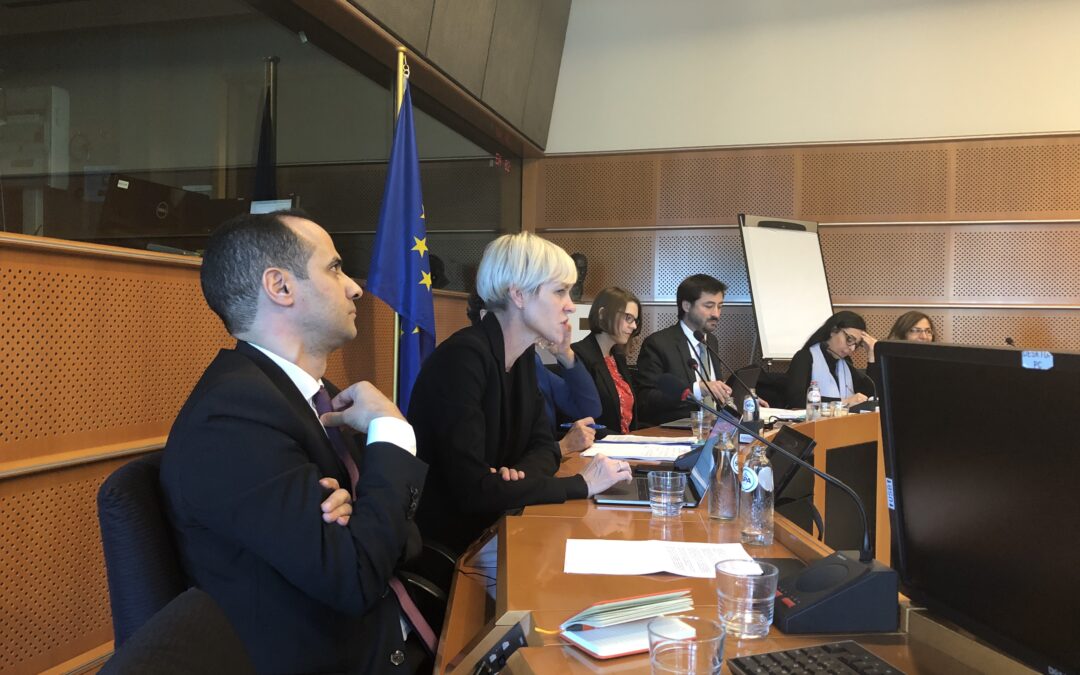
Nov 22, 2019 | News
On 20 November 2019, the ICJ and Tineke Strik, Member of the European Parliament, hosted a roundtable discussion in Brussels on the ICJ’s report Accountability for Crimes under International Law in Libya: An Assessment of the Criminal Justice System.
Panelists called for the establishment of a Human Rights Council mandated Commission of Inquiry on Libya and for States to refrain from entering or implementing agreements that could give rise to support for or complicity in violations of international law.
They also called for the intensification of monitoring of Libyan Coast Guard operations and publication of its key findings, and for the European Commission to ensure its cooperation with Libyan authorities is conditional on meeting concrete, verifiable and timebound benchmarks.
At the launch, Said Benarbia and Kate Vigneswaran, MENA Programme Director and Senior Legal Adviser respectively, discussed the findings and recommendations of the ICJ’s report examining the criminal justice framework in Libya. The report finds that investigations and prosecutions of crimes under international law have been limited to a handful of cases, and substantial reforms to the legal framework are required to ensure fair and effective justice in future cases.
In light of the report’s findings, Marwa Mohammed, Head of Advocacy and Outreach for Lawyers for Justice in Libya, discussed the arbitrary detention of thousands of migrants, refugees and asylum seekers in Libya, systematic human rights violations and abuses being committed against them, and absence of options for protection, repatriation and return, including as a result of EU States’ policies.
Philippe Dam, Advocacy Director for Europe and Central Asia at Human Rights Watch, then discussed the engagement of the EU, European Commission and EU States with Libyan authorities, including in the context of violations and abuses committed against migrants, refugees and asylum seekers intercepted by the Libyan Coast Guard.
The panel was introduced by Karolina Babicka, Legal Advisor for the ICJ’s Europe and Central Asia Programme, and moderated by Tinneke Strik. It was attended by representatives of the European Commission, the EEAS, UNHCR, non-government organizations and independent persons










